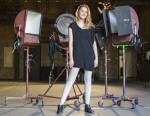Chinese dragons, fortune cookies, flashing pagodas. Classic icons of San Francisco’s Chinatown illuminate the screen as a sultry nightclub singer takes the stage in a crowded speakeasy. In the midst of her performance, a mysterious gentleman at the back of the room catches her eye.
So begins UCLA School of Theater, Film and Television student Chelsey Dubiel’s thesis film, “Of Love, My Siren.” Set in Chinatown, the story centers on two important nights in the relationship between Leu and Tony, who become lovers. Scenes from these nights, which take place five years apart, alternate between flashbacks and the present day.
Dubiel’s choice of setting stems from her affinity for Chinatown. When she lived in San Francisco, she often wandered through its famous neighborhoods for inspiration.
“I lived there for four years and really fell in love with the city, mostly because it became sort of a safe haven for me during a time when I was really trying to figure out what I wanted to do. I would just walk around in the city, and one of my favorite places to get lost was always Chinatown,” Dubiel said.
In fact, Chinatown became the primary influence for the film itself.
“There was something special about Chinatown to me. It’s sort of this really broken-down area, very romantic, and so I really liked the idea of setting a love story there. It’s probably the least romanticized part of San Francisco,” Dubiel said.
Leu, the film’s protagonist, is a cabaret singer who performs at an underground nightclub called Mr. Ken’s Party Room. This location, where Leu meets Tony, is based on an actual nightclub Dubiel discovered while location scouting with director of photography and co-writer Chesley Chen.
Dubiel explained her project, as well as interest in Hong Kong films, to the owner, Ken, who led them to a historic room within the restaurant – a basement where Chinese gangsters used to meet in secret.
“It’s this total ramshackle basement that he’s kind of done up to look like a nightclub, but it’s done in this really special Chinatown kind of way. … It has that certain feeling of nostalgia in some way. Like you could tell that something has happened in that basement,” Dubiel said.
The location subsequently became Mr. Ken’s Party Room. As soon as she decided on the location, Dubiel developed the idea of Leu as a nightclub singer who works there.
“At that point we didn’t have any idea what the female lead character’s background was. And then (Dubiel) went, ‘Oh, we have to shoot here,'” Chen said. “So we saw the spot and then we worked backwards, and that prompted her to say the lead female must be performing here.“
Once she completed her final draft, Dubiel turned her attention to funding in order to bring her idea to life.
Dubiel said that because independent film is now mostly self-funded, she will solicit the support of special niche groups that may have interest in the film, such as organizations for Chinese culture and women in film. In addition, Dubiel will accumulate funds and interest through Kickstarter, a popular online crowd-sourcing site. The film’s Kickstarter will launch on Jan. 27 and will be available through its Facebook page. She shot the Kickstarter video the first week of November in Los Angeles’ Chinatown with the help of Kickstarter producer and UCLA alumna Valentina Vee and associate producer and casting director Tiajha Nakahara.
“It was just kind of like playing in the sandbox, really. The three of us out there, running around with this camera,” Dubiel said.
Filming the Kickstarter also marked the first time the group collaborated on something besides paperwork and logistics and the group said it helped immerse them in the world of the film.
“It kind of just gave us a feel of what it’s going to be like in San Francisco because not everybody can go to San Francisco before we actually shoot. So I think that in a way it also brought us all together and made it seem like we’re actually doing this project,” Nakahara said.
The crew will begin filming in San Francisco’s Chinatown the beginning of next month, in time for Chinese New Year celebrations. Filming will take place in a series of night shoots for seven days.
Dubiel hopes to finish editing “Of Love, My Siren” in time to premiere at the UCLA School of Theater, Film and Television Film Festival in June. She then plans to submit the film to future festivals.
